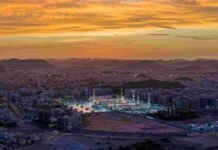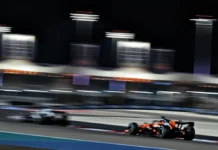Iraq: The farmer, Azad Muhammad, from the Kurdistan region in northern Iraq, swept the virtual world through videos on social media, in which he gave agricultural advice while harvesting onions or picking grapes.
The 50-year-old draws on his extensive experience in how to grow crops and improve vegetables to teach his audience ways to increase production and protect fields from diseases and insects.
Azad Mohammed aims to raise awareness of issues including environmental protection and encourage authorities to support agriculture.
“Our land is fertile, like gold,” Mohamed told the media. Therefore, “we must pay attention to agriculture to achieve a solid economy.”
Mohammed shoots these videos with his smartphone on his seven-acre farm near Halabja, in which he is seen lying on the ground among grapevines and tomato plants, which are then broadcast to his 500,000 followers on Facebook.
In one clip, a farmer, who has carefully shaved his beard and kept a small moustache in elegant traditional Kurdish garb, explains the difference between the two types of onions he just harvested from his land.
“How do we water the pomegranate? How do we protect trees from heat and disease? What is the effect of sandstorms on our trees?
“In another post, he says, “I will broadcast live at nine in the evening, write your questions in the comments box and wait for a response.”
“Some farmers sent me videos showing their products, and they tell me it’s thanks to me. This makes me very happy,” Mohammed told the media.
Protecting the environment
Mohammed notes that half of his followers do not own a field or a farm, “but because of me, they turned the roofs of their homes into gardens and planted in them what they wanted, and this contributes to better preservation of the environment.”
In another video, this farmer advises farmers to plant their trees only two meters apart from each other, not four metres, to ensure that they provide stronger shade, which adds moisture to the ground that protects crops from the summer heat.
“With desertification and less rainfall, we must change the way trees are planted so that some are close to each other,” Mohammed explains.
“Look at these tomatoes: because they were planted in the shade, they came out juicy and well-ripened, while those directly exposed to the sun were burnt.”
In the comments section on one of Mohamed’s videos, Ahmed Hassan, one of his followers, wrote, “They should appoint you as Minister of Agriculture.”
The Kurdistan region is the region least affected by desertification, which semi-desert Iraq suffers from due to lack of rain.
A study by the United Nations and the regional government published in 2019 notes that “the Kurdistan region enjoys high levels of rainfall compared to the centre and the south… and includes the most fertile plain in Iraq.”
But despite this, local authorities do not sufficiently benefit from this advantage, which puts agricultural production “in sharp competition” with “much cheaper foreign crops,” in addition to “dumping” local markets with Iranian and Turkish crops, according to the study.
improve irrigation
The study calls for “more investment” in better irrigation methods.
The report adds that there is “a need for more projects aimed at water management to ensure the efficient use of available water” in order to “mitigate the effects of climate change and rehabilitate agriculture in a more sustainable way.
Hamid Ismail Abdel Rahman (47 years old), a farmer from Kurdistan, said that “the level of water from the wells has decreased significantly,” adding that this “affects the development of agriculture.”
Abdul Rahman opens his farm two days a week to families who come to pick and buy “fresh and organic fruits”, such as cherry tomatoes, eggplant, peppers and corn.
Ismael, who worked for 20 years in the Kut governorate in southern Iraq, believes that the impact of climate change is “less in the north” than in “southern Iraq, which has the lion’s share” of the suffering.
In his electronic clips, Azad Muhammad also tries to answer the questions of his followers and their problems in agriculture, including a question by Abdul Rahman Majid, in which he says, “How do we treat a dry apricot tree? After we spread fertilizer under it?”
Mohamed recently opened a small library on his farm for interested students to visit. Muhammad describes his efforts, saying, “My farm is no longer only a place for farming, but now serves as an agricultural scientific centre, like a college, for example.”



